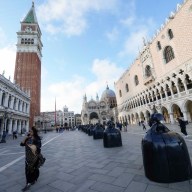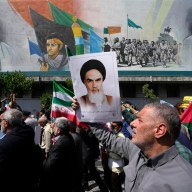By Aidan Lewis and Goran Tomasevic
SIRTE, Libya (Reuters) – A day after the United States began a formal campaign of air strikes against Islamic State’s stronghold in Libya, anti-IS fighters welcomed Washington’s involvement but remained wary of advancing for fear of mines and snipers. The initial U.S. strikes on Monday targeted a tank and two vehicles in Sirte, where the ultra-hardline militants are encircled in the heart of what has become an important base for the group beyond its self-declared caliphate in Iraq and Syria. Fighters from a range of anti-IS brigades are dug in behind sand banks and concrete walls in the coastal city after suffering high casualties in months of street-by-street fighting.
“If the United States is serious about these air strikes we are very pleased, and it will help us on the ground,” said Husam Bakoush, a fighter with the Marsa brigade.
The battle highlights the challenges of driving the Islamic State from Libya, where it has struggled to win local support but exploited the chaos that followed the ousting of Muammar Gaddafi.
The country is still deeply divided and a U.N. backed government had hesitated to call for U.S. support until now for fear of a backlash.
For the fighters on the ground, this was a source of frustration. “Most of my friends are happy, but they asked why it did not happen sooner,” Bakoush said.
Abdalla Ali Ibrahim Ismail, another fighter with Marsa brigade, said the strikes could be a game-changer.
“I think the U.S. strikes will help the ground troops a lot … I hope that when we start to push again against Islamic State positions the U.S. planes will give us cover.
“Morale is much higher, our men were celebrating last night.”
IS COULD REGROUP
Islamic State has been retreating from U.S.-backed campaigns in Syria and Iraq and its presence in Sirte has been reduced to a few hundred fighters who once controlled what was Gaddafi’s hometown. The air strikes in Libya are “open ended”, but each one will be coordinated with the U.N.-backed Government of National Accord (GNA), U.S. officials said.
“We requested support from the United States so that the operation could move quickly and we would not lose more fighters,” said Mokhtar Fakron, an air force spokesman in nearby Misrata, from where the Sirte campaign is being run. The battle for Sirte is now focussed around the Ouagadougou convention centre, a white structure where Islamic State hung its black banner, and in the streets around a hospital and the university.
Monday’s strikes hit close to the convention centre and to the “Dollar” neighbourhood, which fighters took full control of on Saturday, said Fathi Bashagha, who liaises between the GNA and the operation’s Misrata command centre. Islamic State took over Sirte a year ago, but forces from the western city of Misrata allied to the U.N.-backed government began a campaign to liberate it in May.
Misrata forces are positioned on several fronts around the centre, often only a hundred meters from militant positions.
“The areas where Islamic State fighters remain inside Sirte are small and restricted and we don’t have the technical capacity to deal with them,” Fakron said.
Misrata commanders believe that Islamic State commanders – some of them foreign fighters sent by militant leaders in Iraq and Syria – had already fled the city before it was besieged.
Some may have escaped to remote southern Libya, and officials say even after the fall of Sirte they may see militants launching attacks and suicide bombings.
Libyan commanders suspect militants have stored large quantities of arms and ammunition underground in Sirte, and Fakron said this was one target that U.S. strikes could help destroy.
Small teams of Western special forces have been providing intelligence and logistical support in Libya for months, and the United States has previously conducted isolated strikes against militants. But Western powers said they would take more sustained action only at the invitation of the GNA, which arrived in Tripoli in March. The new government had held back, struggling to assert its authority over a fractured country and sensitive to criticism that it had been imposed from the outside. IMPROVISED WEAPONS
At the start of May, Islamic State pushed north-west towards Misrata, provoking a counter attack by Misrata-led brigades that moved swiftly to the edge of Sirte. The GNA scrambled to set up a military command structure in an effort to bring the brigades under its wing. But fighters, many of them volunteers and former rebels who fought in the uprising against Gaddafi in 2011, felt the GNA and the international community had failed to follow up on promises of support. The government had been unable to keep up with developments on the ground, though it eventually released 100 million dinars ($65 million) in financial support, said Bashagha.
“The campaign is going very fast, and the other procedures are very slow,” he told Reuters. “They say, ‘Ok, we’ll see how much you need, when you need it, let me check and get back to you.’ And they get back to you in one month, but your situation is worse.” U.S. air strikes, he said, would “change everything”. As the battle has progressed the brigades say they have become better organised, but they have continued to suffer heavy losses. “The further we advance, the more we’re faced by skilful fighters,” said Suhaib Jahan, stationed a few hundred metres from the Ouagadougou conference hall. “They save their best for last.” At least 350 brigade members have been killed since May and more than 1,500 wounded, with dozens of fighters killed on single days by suicide bombs, snipers and mines.
Lacking modern military equipment the brigades have improvised, mounting pick-up trucks with helicopter rocket pods, buying ammunition off the local black market, and installing an anti-aircraft gun on a coastguard tug positioned off the coast. The air force has been using an ageing fleet of Eastern bloc jets, the most recent of which dates from 1984. Bomb carrying mechanisms for the aircraft have been made in a local workshop.
Charity workers ferry sandwiches and iced drinks from Misrata every day for thousands of fighters and medical staff.
Since Islamic State embedded itself in Sirte, almost all the city’s 80,000 residents have fled. Downtown residential neighbourhoods are now a battleground, with handwritten signs warning of snipers at junctions and blankets strung across roads to give brigade fighters cover. The fighters talk of finding sophisticated booby traps, and explosives hidden among food or furniture, in buildings abandoned by Islamic State. They say they have been left alone to fight a dirty war against an enemy that represents a trans-national threat. “Maybe some of the men would not have come to fight if they’d known it would be like this,” said Ahmed Grayma, a commander positioned near Sirte’s port on Saturday who said his brigade lacked armoured vehicles, protective clothing and mine detectors. “We feel tricked because they said the international community was behind us but our colleagues are dying and we don’t know when it will end.”
(This version of the story has been refiled with changed headline)
(Editing by Patrick Markey and Philippa Fletcher)


















